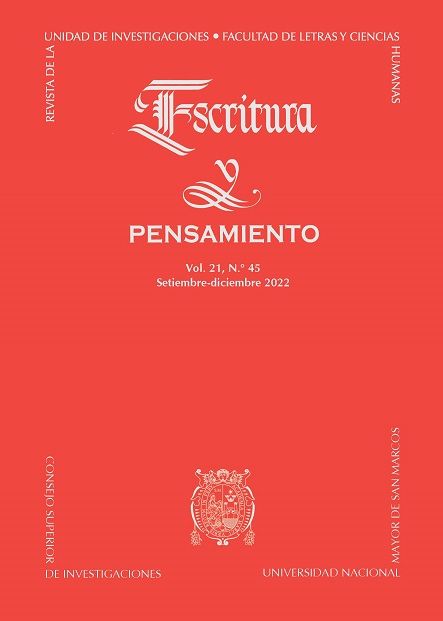Philosophical language as poetry based on the thought of Ludwig Wittgenstein
DOI:
https://doi.org/10.15381/escrypensam.v21i45.23260Keywords:
Wittgenstein, fhilosophy, poetry, dichten, Rorty, manifestos, negative heuristicsAbstract
From aphorisms found in Culture and value and in the Tractatus Logico-Philosophicus, as well as in various testimonies of Ludwig Wittgenstein, this essay will defend the idea that in philosophical language one can find glimpses of a poetic language, and vice versa. In this way, it is intended to create a connection between philosophy and poetry based on Wittgenstein's philosophy or thought, which, among other things, stated that philosophy should only be written as poetry [dichten]. Likewise, the thesis that similar values can be found in philosophical and poetic discourse will be sustained, pointing out Richard Rorty's argument that, like Wittgenstein, Philosophy as Poetry can be done, giving as an example of this thesis the manifestos and specifically pointing out three types of these: the Communist Manifesto of Karl Marx, the Anthropophagous Manifesto of Oswald de Andrade and the Manifesto of the Vienna Circle, valuing these works from both philosophy and poetry, pursuing the objective that it is possible to consider that philosophical and literary language can be used with the same aesthetic and reflective purpose. Finally, the concept of negative heuristics used by Lakatos will be used to support the idea that in the aforementioned example of the Manifestos it is possible to find a single argument or nucleus that resists all kinds of refutations.
References
Asociación Ernst Mach. (2002). La concepción científica del mundo: el Círculo de Viena. Redes 9(18), 105-149. http://ridaa.unq.edu.ar/handle/20.500.11807/659
Bilbeny, N. (2018). Richard Rorty y el papel de la imaginación en el progreso humano. Astrolabio, Revista internacional de Filosofía. doi: 10.1344/astrolabio2018.21.4
Bremer, J.(2020). “An artistic rather than a scientific achievement”: Frege and the Poeticality of Wittgenstein’s Tractatus. https://doi.org/10.1007/s11406-020-00216-3
de Andrade, O. (1928). Manifiesto Antropófago. Revista de Antropofagia.
Dubin, M. (2010). El indio, la antropofagia y el Manifiesto Antropófago de Oswald de Andrade. Revista Espéculo.
Engels, F. y Marx, C. (2000). Manifiesto comunista. www.elaleph. com. Gibson, J. (2004). The Literary Wittgenstein. Routledge West 35th Street, New York, NY 10001.
Heaton, J. & Groves, J. (2002). Wittgenstein para principiantes. Era naciente, documentales ilustrados. Argentina.
Lakatos, I. (1989). La metodología de los programas de investigación científica. Alianza Universidad.
Mangone, C. y Warley, J. (1994). El manifiesto, un género entre el arte y la política. Editorial Biblos.
Nieto, J. (2004). Marx. A 150 años del Manifiesto Comunista. Revista Espacio Abierto Cuaderno Venezolano de Sociología.
Klagge, J. (2021). Wittgenstein’s Artillery, Philosophy as Poetry. Cambridge, Massachusetts: The MIT Press, [2021].
Perloff, M. (1996). Wittgenstein’s Ladder, Poetic Language and the Strangeness of the Ordinary. The University of Chicago Press, Ltd.
Sluga, H. & Stern, D. (2018). The Cambridge Companion to Wittgenstein. Cambridge University Press.
Villena Saldaña, D. (2014). El círculo de Viena. Una nota histórica. Analítica 8(8), 123-130.
Wittgenstein, L. (1998). Vermischte Bemerkungen, Culture and Value. Translate By: Peter Winch. Blackwell Publishers Ltd, Oxford.
Wittgenstein, L. (1995). Cultura y Valor. Trad. Elsa Cecilia Frosi. Editorial Espasa Calpe S. A. España.
Wittgenstein, L. (2016). Wittgenstein Lectures Camdridge 1930-1933. University Printing House, Cambridge CB2 8BS, United Kingdom
Wittgenstein, L. (2009). Tractatus Logico-Philosophicus. Trad. Jacobo Muñoz Veiga. Editorial Gredos, España.
Zurita, R. (2002). Poesía y Nuevo Mundo. http://hdl.handle.net/11185/2421
Downloads
Published
Issue
Section
License
Copyright (c) 2022 Johnny Lima Gamarra

This work is licensed under a Creative Commons Attribution 4.0 International License.
AUTHORS RETAIN THEIR RIGHTS:
a. The authors retain their trademark and patent rights, and also over any process or procedure described in the article.
b. The authors retain the right to share, copy, distribute, execute and publicly communicate the article published in the Escritura y Pensamiento (for example, place it in an institutional repository or publish as part a book), with acknowledgment of its initial publication by Escritura y Pensamiento.
c. Authors retain the right to make a subsequent publication of their work, to use the article or any part of it (for example: a compilation of their work, lecture notes, thesis, or for a book), provided that they indicate the source of publication (authors of the work, journal, volume, number and date).





